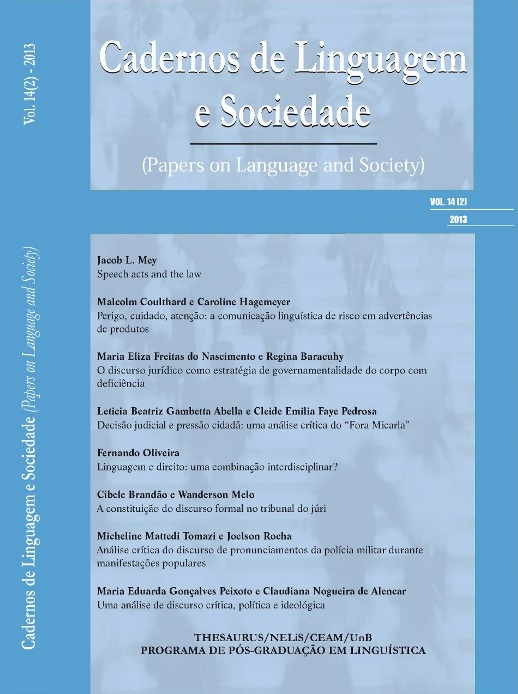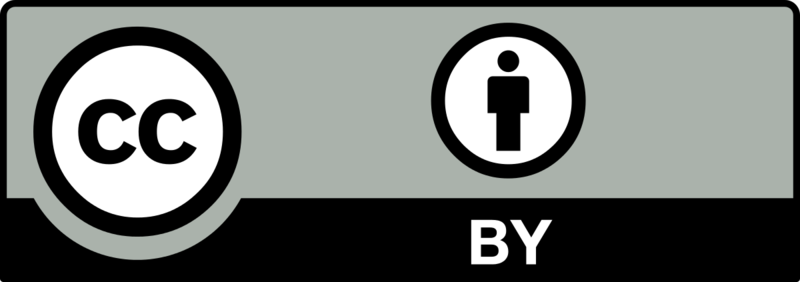Atos de fala e a lei
DOI:
https://doi.org/10.26512/les.v14i2.9197Palavras-chave:
Atos de fala (pragmáticos); Normas legais; Contratos; sequencialidade.Resumo
O presente artigo busca colocar a velha questão da ‘força das palavras’ em uma perspectiva pragmática, especialmente na medida em que a lei e os textos legais são colocados em questão. Ao se questionar a sabedoria do velho ditado “Dizer não é fazer”, mostro que as palavras realmente têm um efeito (o que os filósofos e linguistas têm tentado entender, utilizando os conceitos de ‘ato de fala’ ou ‘ato pragmatico’), e que os constituintes legais desta ‘força’ são precisamente o que faz com que os atos contratuais sejam válidos. Aqui, também, as palavras à s vezes podem ser omitidas, ou substituídas por ações, desde que o contexto o permita. Baseado em alguns casos históricos e contemporâneos, o artigo sugere, além disso, como as palavras de fato podem fazer a diferença em uma variedade de contextos: sociais, legais e outros. O ângulo pragmático (isto é, a orientação para o utilizador) é sempre primordial, e as nossas palavras devem obedecer à s condições pragmáticas, muitas vezes chamadas de ‘affordances’, da situação em que elas estão sendo proferidas.
Downloads
Referências
AZUELOS-ATIAS, Sol. A pragmatic analysis of legal proof of criminal intent. Amsterdam: John Benjamins. (Reviewed by Jacob L. Mey in RASK: International Journal of Language and Communication, 34: 118-123), 2007. Blockmans, Wim. Emperor Charles V 1500-1558. London: Arnold. 2002.
HAUGH, Michael. The constitution of politeness implicature in conversation. Journal of Pragmatics 39: 84-110. 2007.
ISER, Wolfgang. The Act of Reading: A Theory of Aesthetic Response. Baltimore & London: The Johns Hopkins University Press. [Orig. German title: Der Akt des Lesens: Theorie ästhetischer Wirkung.] 1980 [1976].
MEY, Jacob L. When voices clash: A study in literary pragmatics. Berlin: Mouton de Gruyter. 2000.
MEY, Jacob L. Pragmatics: An introduction. Oxford: Blackwell [Second edition]. 2001 [1993].
MEY, Jacob L. Turning the tide of speech. Keynote address at the Third International Symposium ‘Meaning, Context and Cognition’ (MCC 2013), University of Lódz, Poland, 11-13 April 2013.
MORRIS, Charles H. Foundations of the theory of signs. Chicago: University of Chicago Press. (= Rudolf Carnap et al. (eds.), International Encyclopedia of Unified Science, Vol. 2:1). 1938.
OESTERREICHER, Wulf. Dialogue and Violence: The Inca Atahualpa meets
Fray Vicente de Valverde, Cajamarca, Peru, 16th November 1532. In: Andreas H. Jucker, Gerd Fritz and Franz Lebsanft (eds.), Historical Dialogue Analysis, 431- 464. Amsterdam: John Benjamins.1999.
RUNCIMAN, [Sir] Steven. The Sicilian Vespers: A History of the Mediterranean World in the Late 13th Century. Cambridge: Cambridge University Press. (Penguin Pelican edition, 1969, subtitled ‘The rising which brought about the overthrow of the universal papal monarchy’). 1969 [1958].
WEGENER, Philipp. Der Wortsatz. Indogermanische Forschungen 39: 1-26. 1921.
ZAVALA, Silvio A. Las instituciones jurídicas en la conquista de América. México: Porrúa. 2001 [1983].
Downloads
Publicado
Como Citar
Edição
Seção
Licença
Autores/as que publicam nesta revista concordam com os seguintes termos:
Autores/as mantêm os direitos autorais e concedem à revista o direito de primeira publicação, sendo o trabalho simultaneamente licenciado sob a Creative Commons Attribution 4.0 International license que permite o compartilhamento do trabalho com reconhecimento da autoria do trabalho e publicação inicial nesta revista.



